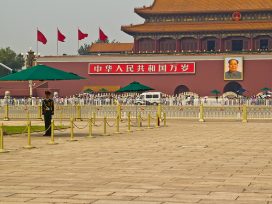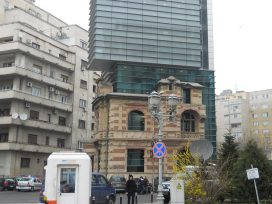“Undoubtedly, leftwingers exist who can find excuses for the Soviet penal universe. But I don’t regularly discuss matters with them”. The Hungarian political scientist Gáspár Miklós Tamás responds to Romanian philosopher Andrei Plesu’s assertion in “Dilema veche” 243 (2008) that “The Left […] hides the Gulag behind a veil of intelligence, nuance, and ‘historical necessity’.”
Articles
Read more than 6000 articles in 35 languages from over 90 cultural journals and associates.
Some comments to G.M. Tamás
Andrei Plesu responds
“Undoubtedly, leftwingers exist who can find excuses for the Soviet penal universe. But I don’t regularly discuss matters with them”. Thus responded Hungarian political scientist Gáspár Miklós Tamás to Romanian philosopher Andrei Plesu’s assertion in “Dilema veche” 243 (2008) that “The Left […] hides the Gulag behind a veil of intelligence, nuance, and ‘historical necessity’.” “Quite honestly, you are too equidistant for my liking”, writes Plesu in his concluding comment.
‘I am not a woman writer’
About women, literature and feminist theory today
In the 70s and 80s, many women found the female in literature inspiring but then Nathalie Sarraute snarled in an interview: “When I write I am neither man nor woman nor dog nor cat.” To her, the notion of female or male writing – écriture féminine ou masculine – was totally void of meaning. Moi finds that since then the discussion has gone nowhere. “To make women second rate citizens of the world of literature is to say that the female experience of the world carries less value than the male.”
I always try to be an optimist
Interview with A. B. Yehoshua
Interviewed in “Host”, the Israeli novelist Avraham B. Yehoshua echoes Barack Obama’s Cairo speech on the necessity for a two-state solution in Israel-Palestine. “I am hopeful that Barack Obama will say to Israel: enough, enough with the settlements,” he says with foresight. “The settlements are the problem.”
The unwillingness of the Lithuanian embassy in Ankara to issue a visa to “Varlik” representative Sila Okur prevented the journal from participating in the Eurozine conference in Vilnius last month. Okur was finally defeated by bureaucratic obstacles erected by an embassy clerk, starting with demands for ever more documents and ending with a summons to the embassy 450 kilometres from “Varlik”‘s offices in Istanbul. In response, “Varlik” dedicates part of its June 2009 issue to “Cultural relations in visa territory”. In an introduction to the themed section, publisher Osman Deniztekin explains why.
“Whether you’re a Scot, of Scottish descent, or simply love Scotland”, Homecoming 2009 is for you (or so the advertising goes). Yet scotophiles should make no mistake: the reinvented Highland culture that emerged in the nineteenth century was but a “tame accessory to British unionism”.

China through Zhuangzi's third eye
Twenty years after Tiananmen, the country is both different and same
Twenty years ago, the velvet revolutions swept communism from eastern Europe. On the other side of the globe, the Chinese government was cracking down on anyone who dared to speak out against the regime, with reprisals culminating in the Tiananmen Square Massacre on 4 June. In the twenty years since Tiananmen, writes Martin Hala, China has risen from the ashes by engaging the West economically and by manufacturing domestic, “patriotic” consent. But as the economic crisis deepens, writes Hala, these achievements might not be sufficient to make the “rising dragon” immune to history.
Local histories: From censorship to self-irony
Closing speech at the 22nd European Meeting of Cultural Journals
During communism, metaphoric language was the only way to negotiate censorship, recalls the poet and editor Kornelijus Platelis. Yet this experience left Lithuanians cut off from the common European culture of rationality, tolerance and self-irony. Regaining this “European attitude” is the task of cultural journals today.
History based on falsification is no history
Opening address by Valdas Adamkus, President of the Republic of Lithuania, at the 22nd European Meeting of Cultural Journals
Six decades after the end of World War II, it is evident that history based on falsification is no history, said Valdas Adamkus, President of the Republic of Lithuania, at Opening address the 22nd European Meeting of Cultural Journals. “We cannot allow politically coloured revenge policies to re-enter historical science and replace our cherished values with technologies.”

European histories, Romanian fairytales
The Securitate archives and the public debate that never was
In Romania, the National Council for the Study of the Securitate Archives has been rendered toothless by political interference and its moral authority drained, writes Mircea Vasilescu. Meanwhile, former communist functionaries, in new democratic guise, still purport to be protecting “national interest”.

Still not free
Why post-'89 history must go beyond self-diagnosis
The dissident generation of the 1970s and 1980s produced a body of work unprecedented in Czech history, says Martin Simecka. Yet it is precisely the monumentality of this generation’s legacy that prevents the interpretation of the communist past going beyond self-diagnosis.
One type of censorship comes to an end, but a new is developing, writes cultural theorist Dave Boothroyd. The power that corporations such as Network Solutions or YouTube wield produces a new form of subjectivity characterized by self-censorship.

Eurozine conference held in Vilnius
22nd European Meeting of Cultural Journals, 8-11 May 2009
Globalisation is leading to more belief, not less. “New Humanist” editor Caspar Melville talks to John Micklethwait, the editor of “The Economist” about his new book tracing the rise and rise of religion.
Two stories of absent friends
Inaugural address at the 22nd European Meeting of Cultural Journals, Vilnius, 8 May 2009

Jaroslaw Kuisz comments on two iconic Polish films that show the brutality, fear and loneliness that have accompanied the new political order. In Wladislaw Pasikowski’s “Psy” (Pigs, 1992) a former security service agent turned respectable post-communist policeman resolves to avenge the death of three colleagues. And in Krzysztof Krauze’s “Dlug” (Debt, 1999), two young businessmen, trapped into life as mobsters, commit murder, then confess.